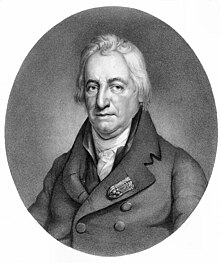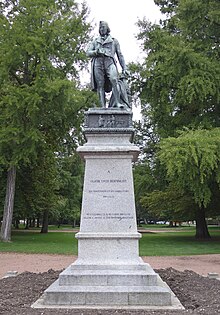Claude Louis Berthollet
This article needs additional citations for verification. (January 2013) |
Claude Louis Berthollet | |
|---|---|
 | |
| Born | 9 December 1748 |
| Died | 6 November 1822 (aged 73) |
| Nationality | Savoyard-French |
| Alma mater | Chambéry, Turin |
| Known for | Berthollides Berthollet's salt Chemical affinity Chemical equilibrium Reversible reaction Silver nitride Sodium hypochlorite |
| Awards | ForMemRS (1789) |
| Scientific career | |
| Fields | Chemistry |
| Institutions | Academy of Science |


Claude Louis Berthollet (French pronunciation:
Biography
Claude Louis Berthollet was born in Talloires, near Annecy, then part of the Duchy of Savoy, in 1749.
He started his studies at Chambéry and then in Turin where he graduated in medicine. Berthollet's great new developments in works regarding chemistry made him, in a short period of time, an active participant of the Academy of Science in 1780.
Berthollet, along with Antoine Lavoisier and others, devised a chemical nomenclature, or a system of names, which serves as the basis of the modern system of naming chemical compounds.
He also carried out research into
Berthollet first determined the elemental composition of the gas ammonia, in 1785.
Berthollet was one of the first chemists to recognize the characteristics of a reverse reaction, and hence, chemical equilibrium.
Berthollet was engaged in a long-term battle with another French chemist,
Berthollet was one of several scientists who went with Napoleon to Egypt and was a member of the physics and natural history section of the Institut d'Égypte.
Awards and honours
In April, 1789 Berthollet was elected a Fellow of the Royal Society of London.[2] In 1801, he was elected a foreign member of the Royal Swedish Academy of Sciences. In 1809, Berthollet was elected an associate member first class of the Royal Institute of the Netherlands, predecessor of the Royal Netherlands Academy of Arts and Sciences.[3] He was elected an Honorary Fellow of the Royal Society of Edinburgh in 1820[4] and a Foreign Honorary Member of the American Academy of Arts and Sciences in 1822.[5]
Claude-Louis Berthollet's 1788 publication entitled Méthode de Nomenclature Chimique, published with colleagues
A French High School located in Annecy is named after him (Lycée Claude Louis Berthollet).
-
1787 copy of "Méthode de Nomenclature Chimique"
-
Title page of "Méthode de Nomenclature Chimique"
-
Table of contents for "Méthode de Nomenclature Chimique"
Personal life
Berthollet married Marie Marguerite Baur in 1788.[4] Their son, Amédée-Barthélémy Berthollet, died in 1811 of carbon monoxide poisoning via charcoal-burning suicide in which he had recorded his physiological and psychological experiences as a final scientific contribution before losing consciousness and succumbing to the fumes.[9]
Berthollet was accused of being an atheist.[10]
He died in Arcueil, France in 1822.
See also
References
- ^ Po-chia Hsia, R.; Lynn Hunt, Thomas R. Martin, Barbara H. Rosenwein and Bonnie G. Smith (2007). The Making of the West, Peoples and Culture, A Concise History, Volume II: Since 1340 (2nd ed.). New York: Bedford/St. Martin's. p. 685.
{{cite book}}: CS1 maint: multiple names: authors list (link) - ^ "Library and Archive Catalogue - Berthollet; Claude Louis (1748 - 1822); Count". Royal Society. Archived from the original on 21 November 2011. Retrieved 13 December 2010.
- ^ "Claude-Louis Berthollet (1748–1822)". Digitaal Wetenschapshistorisch Centrum. Royal Netherlands Academy of Arts and Sciences. Archived from the original on 3 June 2016. Retrieved 22 May 2016.
- ^ ISBN 0-902-198-84-X. Archived from the original(PDF) on 19 September 2015. Retrieved 12 April 2015.
- ^ "Book of Members, 1780–2010: Chapter B" (PDF). American Academy of Arts and Sciences. Archived from the original (PDF) on 18 June 2006. Retrieved 24 June 2011.
- ^ Guyton de Morveau, Louis Bernard; Lavoisier, Antoine Laurent; Berthollet, Claude-Louis; Fourcroy, Antoine-François de (1787). Méthode de Nomenclature Chimique. Paris, France: Chez Cuchet (Sous le Privilége de l'Académie des Sciences).
- ^ "2015 Awardees". American Chemical Society, Division of the History of Chemistry. University of Illinois at Urbana-Champaign School of Chemical Sciences. 2015. Retrieved 1 July 2016.
- ^ "Citation for Chemical Breakthrough Award" (PDF). American Chemical Society, Division of the History of Chemistry. University of Illinois at Urbana-Champaign School of Chemical Sciences. 2015. Archived (PDF) from the original on 19 September 2016. Retrieved 1 July 2016.
- S2CID 233205099.
- Lagrange believed in God. But they did not like to say so." Baron Gaspard Gourgaud, Talks of Napoleon at St. Helena with General Baron Gourgaud (1904), page 274.
Further reading
- Satish, Kapoor (1970–1980). "Berthollet, Claude Louis". ISBN 978-0-684-10114-9.
- N. S. Kurnakow (1925). "Singuläre Punkte chemischer Diagramme. (Dem Andenken CLAUDE-LOUIS BERTHOLLET, 1748–1822)". Zeitschrift für anorganische und allgemeine Chemie. 146 (1): 69–102. .
- Barbara Whitney Keyser (1990). "Between science and craft: The case of berthollet and dyeing". Zeitschrift für anorganische und allgemeine Chemie. 47 (3): 213–260. .
- Charles Coulston Gillispie (1989). "Scientific Aspects of the French Egyptian Expedition 1798‒1801". Proceedings of the American Philosophical Society. 133 (4): 447–474. JSTOR 986871.
- H. E. Le Grand (1976). "Berthollet's Essai de statique chimique and Acidity". Isis. 67 (2): 229–238. S2CID 224833287.
- Swain P. A. (2000). "Hypochlorite bleaches in the textile industry: A history". School Science Review. 82 (299): 65–71.



